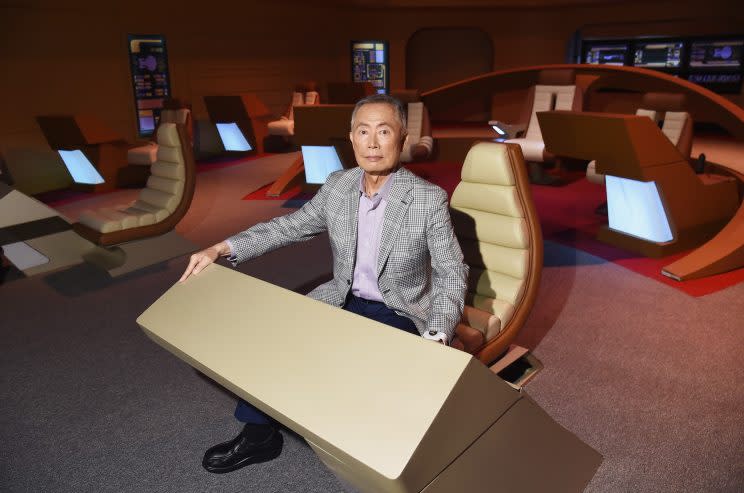George Takei on Muslim registry: ‘Have we learned nothing?’

Actor and activist George Takei is speaking out against the notion that internment camps for Japanese-Americans during World War II established precedent for a potential registry of Muslims in the U.S.
For Takei, who spent his childhood in an internment camp, to tout this dark chapter in American history is to ignore the tragedy that took place when 120,000 people were robbed of their home, livelihood and freedom.
Takei, who rose to prominence on “Star Trek” and later connected with a new generation as a social media personality, penned an op-ed for the Washington Post on Friday criticizing Carl Higbie, a prominent Donald Trump surrogate, for suggesting that the internment would allow the president-elect to establish a database of Muslims.
“Let us all be clear: ‘National security’ must never again be permitted to justify wholesale denial of constitutional rights and protections,” Takei wrote. “If it is freedom and our way of life that we fight for, our first obligation is to ensure that our own government adheres to those principles. Without that, we are no better than our enemies.”
Trump told Yahoo News last year that he was open to a potential database for Muslim Americans. The real estate mogul distanced himself from the proposal, but this week a Trump policy adviser said the president-elect was mulling a registry for immigrants from Muslim countries.
On Wednesday, Higbie, the co-chair of the Great America PAC, told Fox News’ Megyn Kelly that Trump’s proposed registry would be legal and “hold constitutional muster.” Video of the striking exchange sparked headlines across the country.
“We did it during World War II with Japanese, which you know, call it what you will,” he said.
Kelly pushed back against the idea: “Come on, you’re not proposing we go back to the days of internment camps, I hope.”
“No, no, no, I’m not proposing that at all Megyn,” he said. “I’m just saying there is precedent for it.”
“You can’t be citing Japanese internment camps as precedent for anything the president-elect is going to do,” Kelly said.
Takei agrees with Kelly. In the Washington Post essay, he talks about how his family was forced from their home at gunpoint when he was just 5 years old to live in a horse stable near a racetrack. A few weeks later, they were sent to Arkansas’ Rohwer War Relocation Center, which was essentially a prison, complete with armed guards and searchlights.
Years later, when Takei studied government and civics at school, he came to view the internment as not just an attack on Americans of Japanese descent but also on the Constitution. Fear and prejudice had trampled over that founding document’s guarantees of due process and equal protection, he said.
Slideshow: World War II Japanese internment camps in the U.S. >>>
“It had been a Democratic administration at the time, under Franklin D. Roosevelt, that had ordered us to the camps, proving that demagoguery and race-baiting knows no party,” he wrote.
Takei also criticized Trump for telling Time magazine that he wasn’t sure whether or not he would have supported the internment.
“I would have had to be there at the time to tell you, to give you a proper answer,” Trump said in December 2015. “I certainly hate the concept of it. But I would have had to be there at the time to give you a proper answer.”
Around the same time, Trump told ABC’s “Good Morning America” that his proposed ban on Muslims from entering the country is “no different than FDR’s solution.”
In response to Trump and Higbie, Takei said unequivocally that greater security cannot be used to justify ethnic or religious discrimination. He said Americans cannot allow the government to become an “instrument of terror and division.”
“We cannot permit this invidious thinking, discredited by history at the cost of so much misery and suffering by innocents, to take root once again in America, let alone in the White House,” he said. “The stigmatization, separation and labeling of our fellow humans based on race or religion has never led to a more secure world. But it has too often led to one where the most vulnerable pay the highest price.”
In 1988, President Ronald Reagan — one of Trump’s professed political heroes — signed legislation apologizing to the victims of the internment camps.





